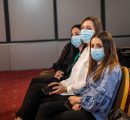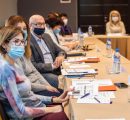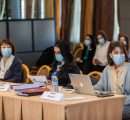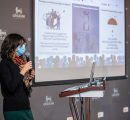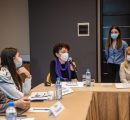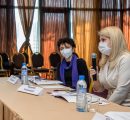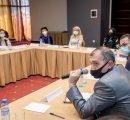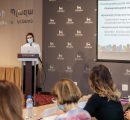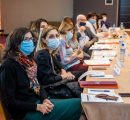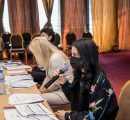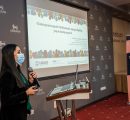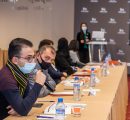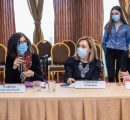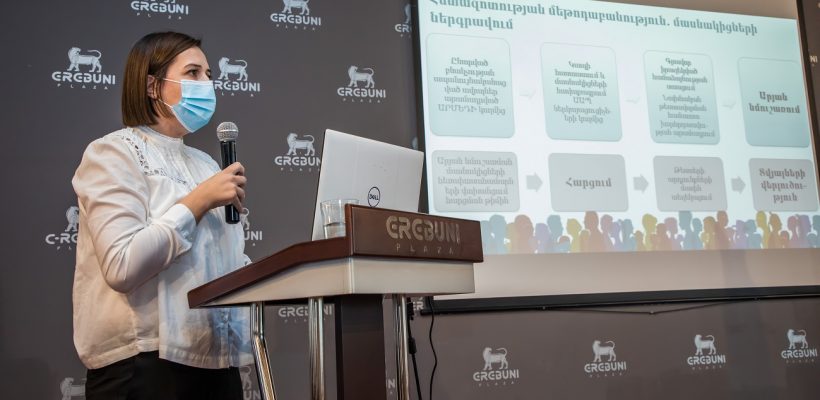
AUA Communicates Results of Nationwide COVID-19 Study
3 min readYEREVAN, Armenia — The American University of Armenia (AUA) Fund, in collaboration with the Ministry of Health of the Republic of Armenia, is implementing the United States Agency for International Development (USAID)-funded project, Support to Control COVID-19 and Other Infectious Disease Outbreaks. The project is working to strengthen Armenia’s national capacity to control COVID-19 and other communicable disease outbreaks and emergencies of potential public health concern. The work undertaken through this project is aligned with and directly contributes to advancing the government’s Public Health Emergency Preparedness and Response Strategy.
On December 8, 2021, the AUA Avedisian Onanian Center for Health Services Research and Development (CHSR) brought together key stakeholders within Armenia’s healthcare system to share the findings from a recent study performed through the project. The qualitative and quantitative studies examined the knowledge, attitude and practices (KAP) of the Armenian population on COVID-19 and other infectious diseases, with a particular focus on COVID-19 vaccination. The stakeholder meeting aimed to not only disseminate the main findings but also to generate discussion and brainstorming on ways to improve the population’s health literacy about infectious diseases and the benefits of vaccination. Representatives from governmental and non-governmental organizations attended the meeting, including the Ministry of Health of the Republic of Armenia, National Institute of Health, Information and Public Relations Center at the Office of the Prime Minister, World Health Organization, UNICEF, UNDP, and other local and international organizations.
Dr. Tsovinar Harutyunyan, associate professor at the Turpanjian College of Health Sciences (CHS), primary investigator of the study and co-investigator of the USAID project, discussed the rationale for the study and the development of the research protocol. She particularly underscored: “The assessment of the Armenian population’s knowledge, attitude, and practices on COVID-19 and other infectious diseases aimed to inform the development of communication strategies and interventions by our team. Effective health communication is based on scientific evidence and uses theory-driven approaches to behavior change.”
The population-based quantitative study included a representative sample of 3,483 adults from Yerevan and all marzes and assessed public knowledge, attitudes, and practices regarding transmission, manifestation, and treatment of infectious diseases. According to the study findings, the public has demonstrated generally sufficient knowledge of COVID-19 and reported apprehension of the necessary COVID-19-related information. At the same time, the study revealed a low-risk perception of the disease severity among the general population, even though the risk perception of getting the infection was considerably high. The study findings also suggest that the public believes in the efficiency of preventive measures (hand and respiratory hygiene, physical distancing), although the reported practice of those measures was found to be lower.
The study also brought to light a high percentage of those surveyed believe in existing conspiracy theories on the pandemic. Most of the participants also indicated they believed that a COVID-19 vaccine is protective against severe illness and death, and thought that vaccination should be made mandatory. More than half of non-vaccinated respondents intended to get the vaccine in the future, while more than 85% of the respondents were concerned about possible side effects, and 58% wrongly thought that the vaccine could make them sick with COVID-19. The qualitative study that investigated the experiences and attitudes of the general public and primary healthcare physicians, revealed fear from and hesitancy in getting the COVID-19 vaccination.
The participants at the meeting discussed the use of presented data for the development of communication strategies to increase awareness and promote vaccination against COVID-19 in the Armenian population endorsing the course of activities initiated by the AUA team for this purpose, which include development of awareness-raising materials on myths surrounding COVID-19 vaccination, radio ads, and video public service announcements. The participants agreed to work in a collaborative manner to address population needs for infectious disease-related information and communication and avoid unnecessary duplication of efforts.
The AUA Turpanjian College of Health Sciences works actively to improve population health and health services in Armenia and the region through interdisciplinary education and development of public health professionals to be leaders in public health, health services research, and evaluation, health care delivery, and management.


